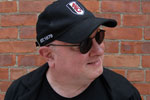 |
|
|
 CHRIS BRUBECK’S TRIPLE PLAY (feat. FRANK BROWN and DAVE BRUBECK) CHRIS BRUBECK’S TRIPLE PLAY (feat. FRANK BROWN and DAVE BRUBECK)Zankel Music Center Skidmore College Saratoga, NY June 10, 2011 by J Hunter “But… But… They don’t play jazz!” Well, that’s not strictly true. Chris Brubeck’s Triple Play’s sound is a lot closer to the Wood Brothersthan Medeski Martin & Wood. But that’s not even close to a good reason formissing one of the most joyous concert experiences I’ve had all year. And anyway, if jazz was what you wanted, you got that right out of the gate. After the welcoming ovation from the capacity crowd hadfinally quieted down (“Jeez, we should quit now, while we’re ahead,” Brubeck cracked,laughing delightedly), they launched into a jumping take on Dave Brubeck’s“Polly”, with Brubeck playing barrelhouse rag on piano while Joel Brownmirrored him on acoustic guitar and Peter Madcat Ruth spiced things up withsome sharp chromatic harp. The trio passed around the solo spot like theHeatles pass the ball on the fast break, keeping the audience’s head on aswivel the entire time. The depth of that achievement was revealed at the endof the piece when Brubeck wryly revealed, “Yes that was a tune without monitors!” Basically, if you’re not having fun while watching this group, then damn it, they’ll have it for you! Brubeck literally vibrated while he played fretless bass on “New Stew”(Opus 2)”, a festive tribute to King Curtis’ “Memphis Soul Stew”, and the trio’s shared smiles showed their out-and-out love for the original while beinginspired to create something new and vibrant. Madcat preceded “a little bit of Mississippi party music” by blowing a hot blues chord through one of his arsenal of harmonicas and letting out an unbridled howl; when the crowd figured out that was a demonstration, you had a great call-and-answer session that propelled Triple Play into “Good Morning, Blues.” Chris Brubeck may be the most skilled musician in hisfamily: He plays piano, fretless bass, and bass trombone with equal virtuosity, and his passion for the music comes through no matter what instrument he’s wowing you with. In addition to the various harps he traded out – sometimes in mid-solo – over the course of the evening, Ruth also exhibited a MacGyverstreak with his home-made “percussion section”, which was the synthesis of ahigh-hat pedal, a frying pan, a couple of screws, and a few small instrumentsthat helped lay what little foundation Triple Play needed. Brown just plays the acoustic guitar, and he does it absolutely splendidly, without the myriad effects pedals some guitarists use as a crutch (Lookin’ at you, A Di Meola)). And while Triple Play can conjure outstandingthree-part harmony at the drop of a hat, it was Brown’s vocals on thetimely-once-again “Brother Can You Spare a Dime” that was the most effecting. The latter tune featured Joel’s father Frank Brown, an 85-year old Finger Lakes substitute teacher who (in Joel’s words) “practices a lot more than I do!” Frank’s Old School clarinet work gave the Depression-era piece serious authenticity, and he teamedup with Madcat to give the rest of the set one of the more unique “front lines”you’ll ever see. Ther were a few bumps in the road, though: Frank tried to play along during “Win the Lotto”, Madcat’s musical plan to solve the country’s economic crisis, but he was laughing too hard. Frank Brown wasn’t the only elder statesman in the house. The standing ovation was thunderous as a frail, 90-year old Dave Brubeck wasled onstage in the middle of Triple Play’s second-set opener “Blue Rondo a laTurk.” It took him a while to warm up, but once he got going, there was no stopping him. Triple Play’s instrumental makeup gave “Rondo” and “Three to GetReady” a refreshing brightness, and Frank’s clarinet added a delightful twist to the reed parts. “Take Five” also got a slight face lift, thanks to Ruth’shilarious jaw-harp solo. The elder Brubeck loved it all, laughing along withthe rest of the group as the music and the fun energized him. Even if Brubeckhadn’t played at all, it would have been worth it just to hear his warm andfunny monologue about the time the State Department wouldn’t let the DBQ comehome from their “People to People” tour of Soviet satellite states; their was asomber moment at the end when Brubeck talked about the late Joe Morello’s ability to hear the Afghan street musician’s rhythms and play them back perfectly. “He frightened them,”Brubeck told us, his voice cracking. Unless great music and great fun scares you, there’s nothing frightening about Chris Brubeck’s Triple Play. Remember that the next time theycome through, and that little voice pipes up, “But… But… They don’t play jazz!” J HUNTER is a former announcer/producer for radio stations in the Capital Region and the Bay Area, including KSJS/San Jose (where he was Assistant Music Director/Jazz Programming) and Q104 WQBK/Albany. He is a frequent contributor to the web site All About Jazz and to the monthly music magazine State of Mind. He currently resides in Clifton Park. |







